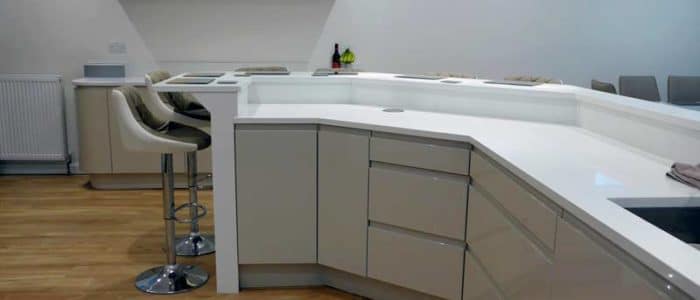Whether you’re renovating an old kitchen or building a brand new kitchen from scratch, deciding on your new worktops is an important part of the process.
It’s not an easy decision though. There are a wealth of excellent materials for solid stone worktops out there for you to consider, without even mentioning the layout or design.
To help make that decision a little easier, this article will take a close look at two of the most popular materials for stone kitchen worktops — wood and stone. Both surfaces offer a beautiful, natural and unique finish to your kitchen, but over their lifetimes, they’ll give you a very different experience, particularly in regard to upkeep.
So, without further ado, let’s jump into some pros and cons.
WOOD WORKTOPS
When thinking about wood countertops for a kitchen, you’ll most likely be looking at a hardwood such as oak, walnut or iroko.
Pros
- Compared to stone, wood can be relatively cheap, although this depends on which wood and granite stone you’re looking at.
- Wood is easy to work with and is also malleable.
- You can re-sand and re-oil wood to keep it looking new.
- It gives your kitchen a warm, natural look.
Cons
- Even the hardest woods require a lot of maintenance.
- You’ll need to re-seal your wood with oil at least once a month, preferably with some sanding.
- Without regular upkeep, water can easily stain wood.
- Sink areas often become damaged by water.
- Wood is not very heat resistant and can be easily marked by a hot pan or baking tray.
STONE WORKTOPS
Stone worktops are often made from marble, granite or engineered quartz. Each stone has slightly different attributes (and very different looks), but we can make general comparisons to wooden worktops.
Pros
- Stone is intrinsically hard-wearing, making it difficult to scratch.
- It’s very resistant to heat.
- Stone requires very little maintenance once installed properly.
- It can provide a variety of looks and feels for your kitchen, from rustic to minimalist.
- Stone is extremely long-lasting, so more of a one-off investment than wood.
- When you choose natural stone, every worktop is unique.
Cons
- Can cost more upfront than other materials.
- Needs to be sealed properly.
- Could crack if hit with enough force, but this is not that common in stones such as granite or quartz.
SO, WHICH SHOULD YOU CHOOSE?
The material you choose depends on your circumstances. Wood is an excellent choice for some, stone is fantastic for others. But we would say that if your concern is how good your worktop will look in ten years, and how much effort you’ll have to put in to keep it that way, then stone is likely the right choice for you.
Keep in mind, however, that if you want to get the most out of your stone worktops, you need to ensure that they’re installed by a professional. And that’s where we can help!
If you want to find out more about what a stone kitchen worktop can offer you, including the differences between marble, granite and quartz worktops, then contact us at 0117 956 3030 or drop in for a chat at our Bristol showroom.
